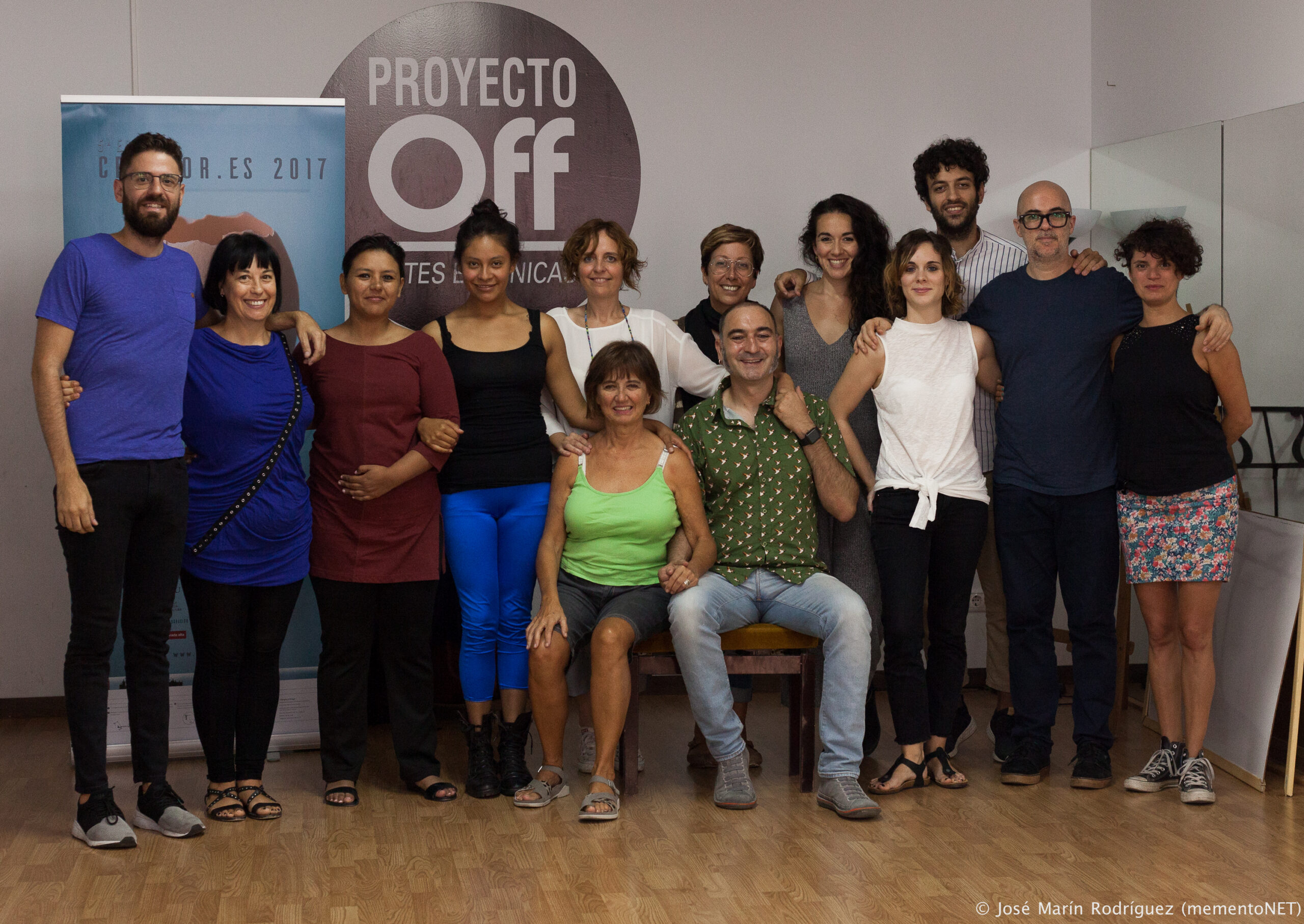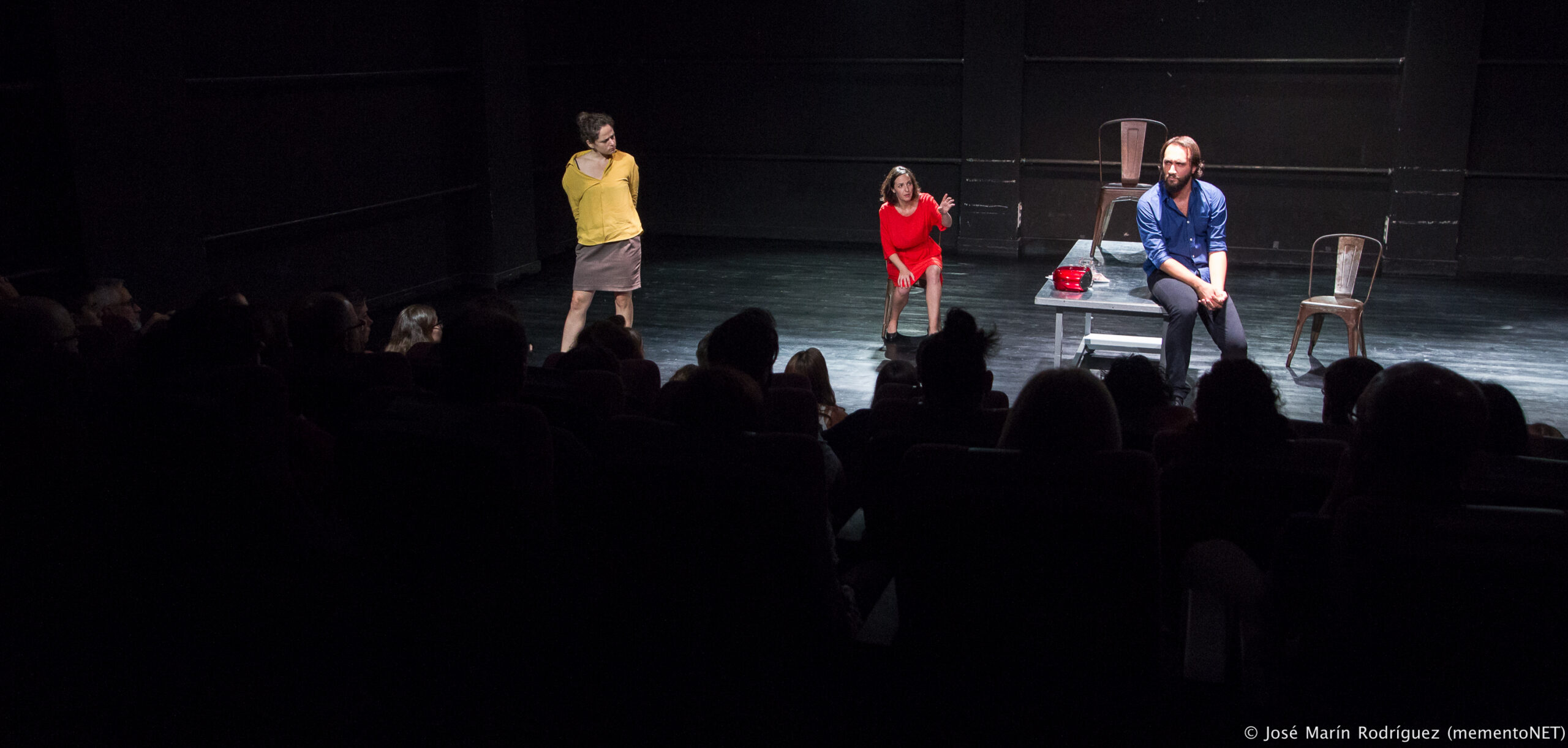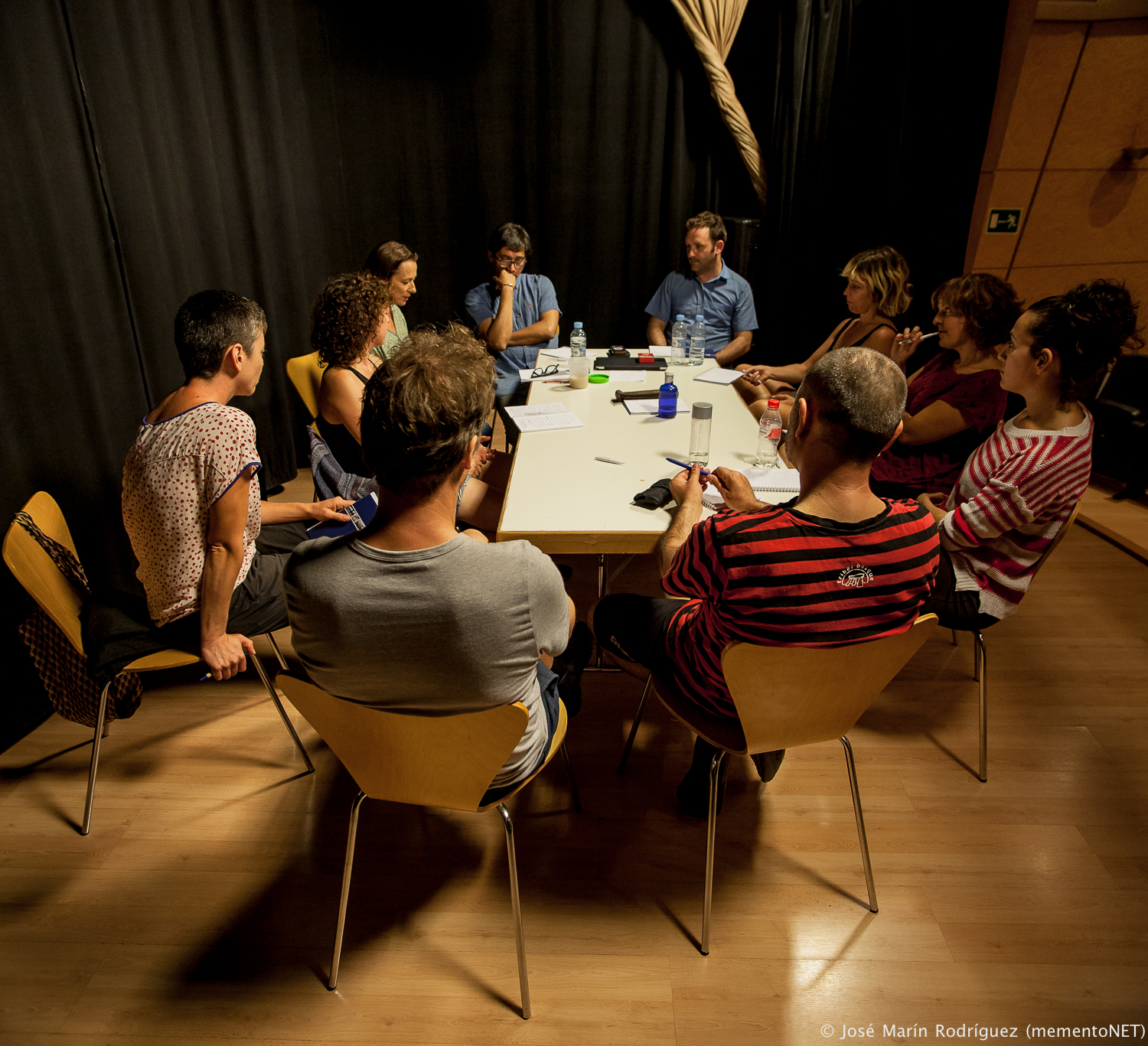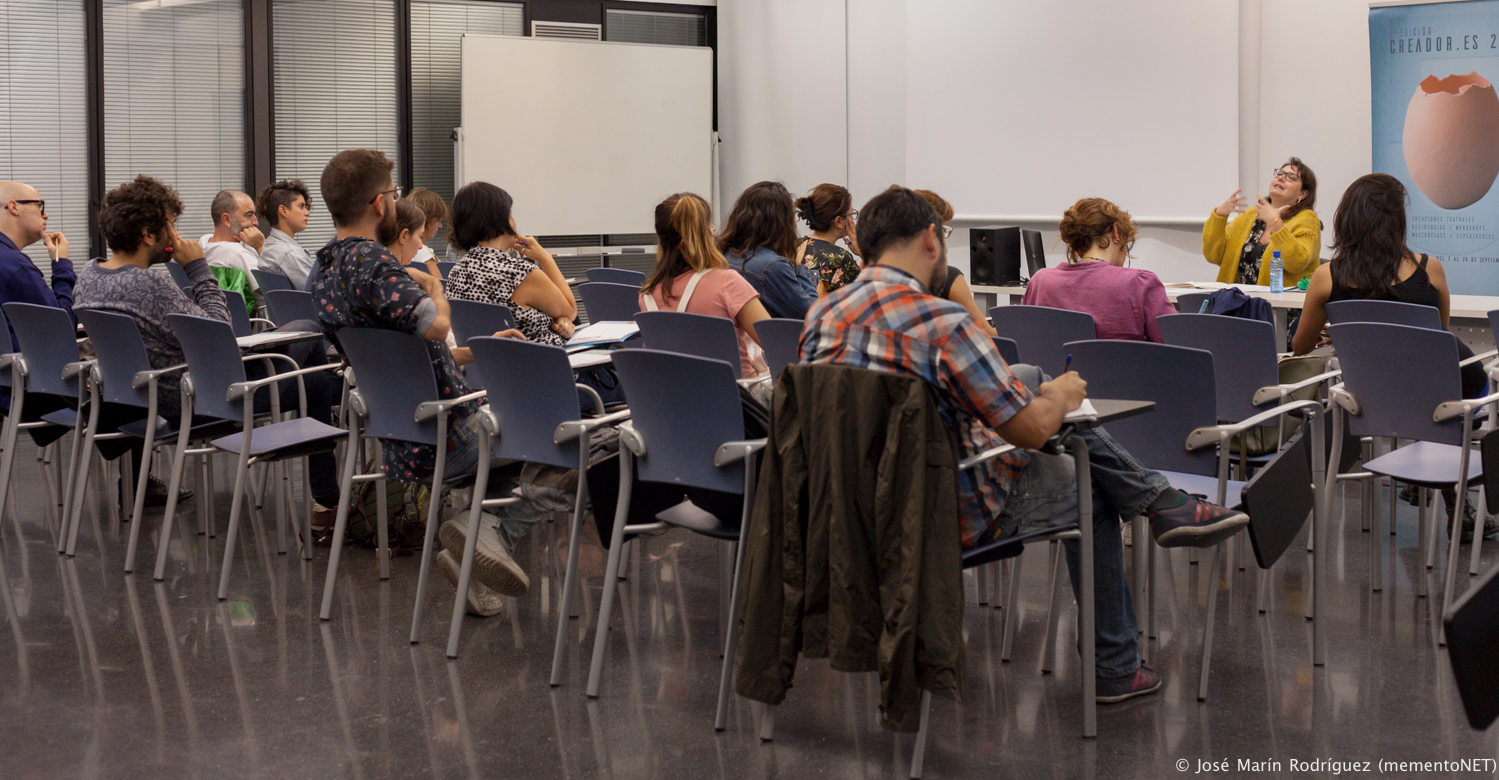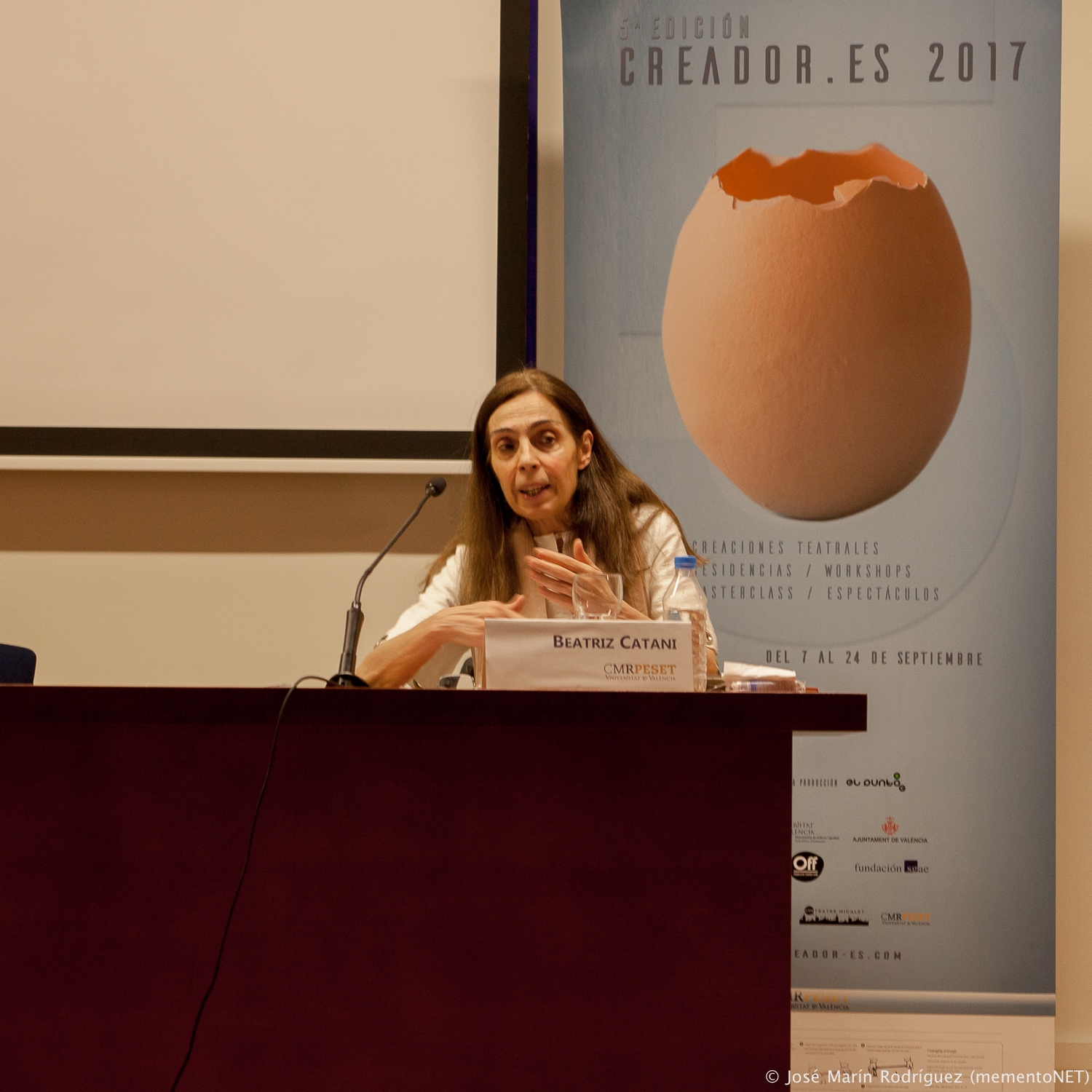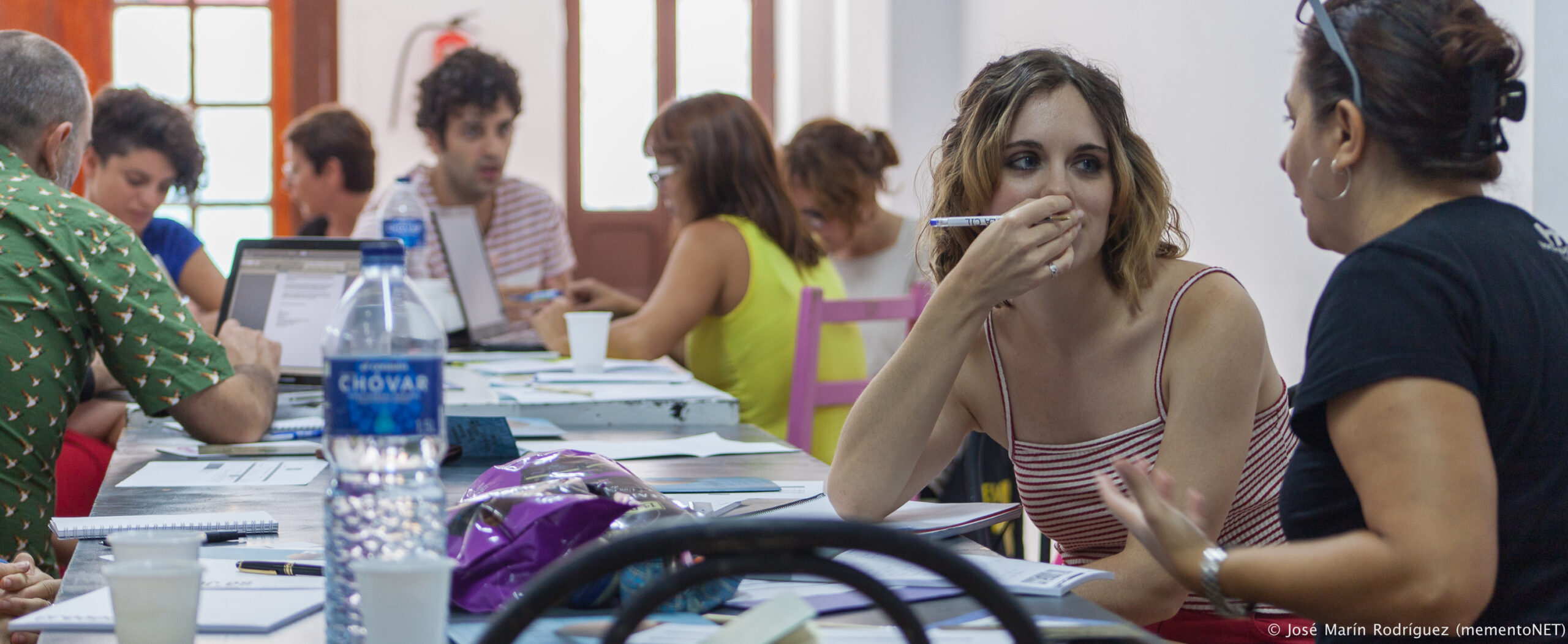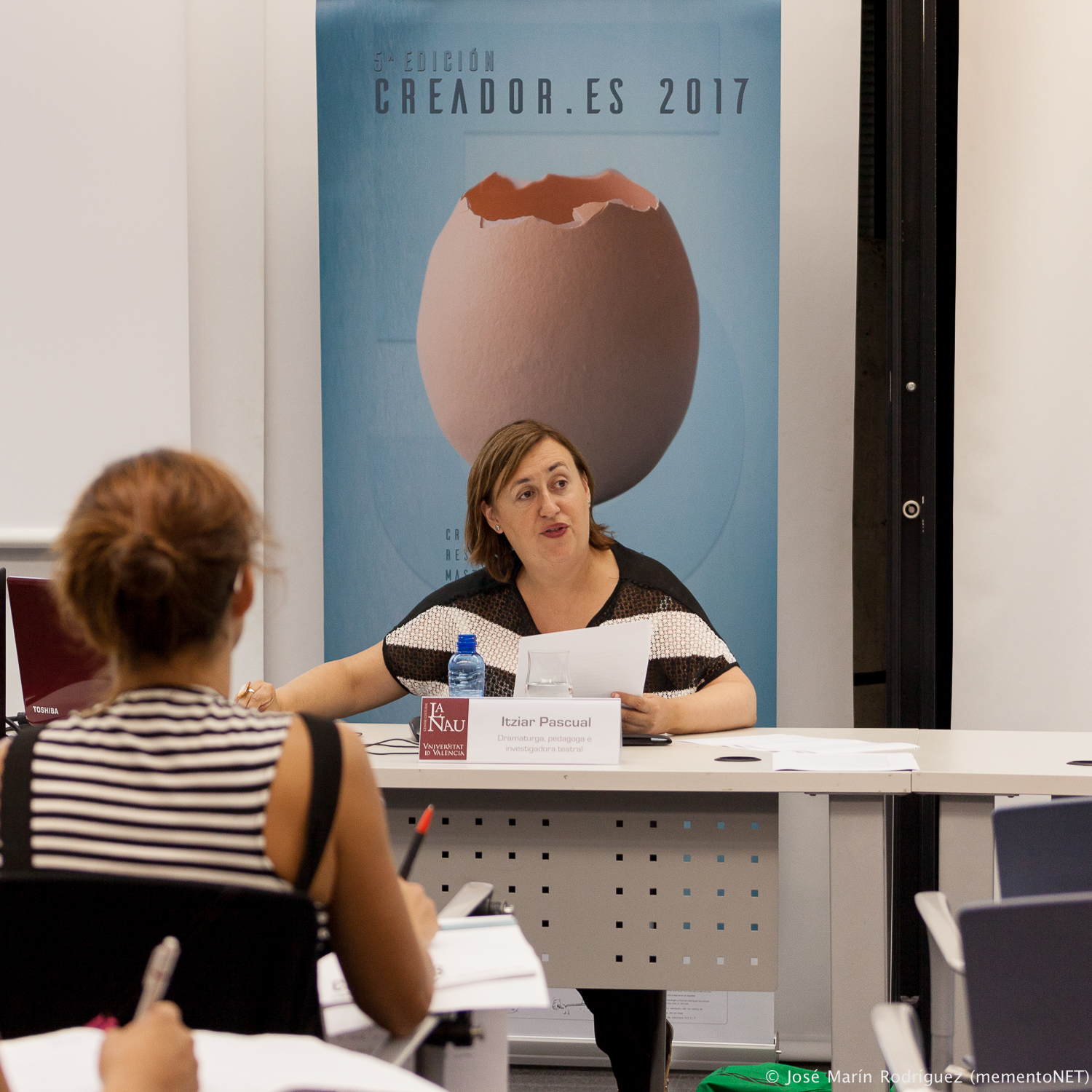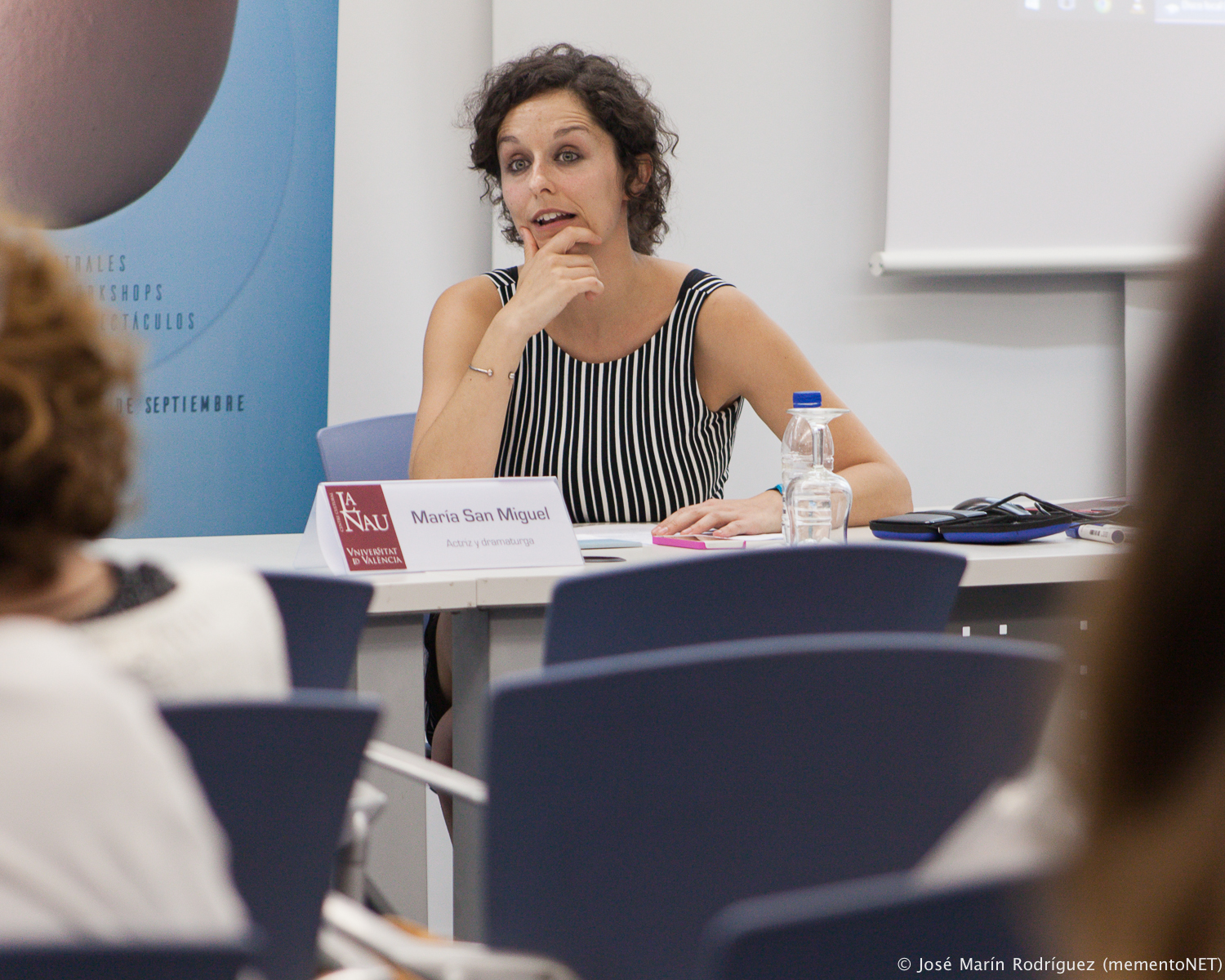Creadores theatre residences
2017
Theme
5 YEARS
Dates
FROM SEPTEMBER 11 TO 23, 2017
Workshop
“Rituales para no partir” with SANTIAGO LOZA
Synopsis
Based on exercises about farewell and mourning. Making fiction about one’s own experience. Visiting stories that belong to different genres, spaces and ghosts. Crossing fantasy with hyperrealism. The situations surrounding an absence. The crossing of the ridiculous and banal with the transcendent. Going from the sacred to the profane without not even realising.
Biography of the author
Argentine director, writer, film and television screenwriter and dramaturg who has won several awards for his independent film productions. He studied at ENERC and the Municipal School of Dramatic Arts. Among his plays are Amarás la noche, He nacido para verte sonreír, El mal de la montaña, Matar cansa, La mujer puerca, Nada del amor me produce envidia, Pudor en animales de invierno, Todo verde, Tu parte maldita, and La vida terrenal. As a film director, his feature films include Extraño, Rosa Patria, La invención de la carne, La Paz and Breve historia del planeta verde. His films have been screened at international festivals such as Cannes, Locarno, Berlin, San Sebastián and London.
In 2014, he received the Konex Diploma of Merit in the Theatre category for the 2009-2013 period for his work as a dramaturg, as well as the Teatro XXI and Trinidad Guevara awards, and was nominated for the Teatros del Mundo, Florencio Sánchez and María Guerrero awards.
In 2017, he published his first fiction novel, El hombre que duerme a mi lado. This was followed by La Primera Casa, the non-fiction books Nadadores Lentos (Documenta) and Diario Inconsciente (Bosque Energético), and the book of poems Noventa y nueve naturalezas muertas (Gog y Magog). In 2018 and 2019, he worked as a tutor in the INCAA Screenplay Development competition. In 2021, he was recognised with a Diploma of Merit from the Konex Awards as one of the five best decade argentinian’s screenwriters. He was part of the International Writing Program at the University of Iowa, United States. He won the National Literature Award in the Film Screenplay category.
Synopsis
Biography of the author
Workshops
“Problemas actorales en el teatro contemporáneo: actor, personaje y silueta” with EDGAR CHÍAS and CRISTIAN DRUT .
Synopsis
Dramaturgs Chías and Drut will analyse how to approach the stage at a time when theatrical writing is pushing narrative systems to their limits and challenging the fundamentals’ representation. They will develop exercises aimed at verifying acting techniques that depart from nineteenth-century naturalistic realism. These procedures will enable the creation of activities that help to understand the rhythmic games of language, the hybrid condition of stage presence and non-verbal stage storys. The masterclass will also include a section focused on reflection and the deployment of possible ‘stage seeds’ or triggering images.
Biography of the author
Edgar Chías:
Mexican dramaturge, translator, screenwriter, and cultural project manager. He has a degree in Dramatic Literature and Theatre from the Universidad Nacional Autónoma de México. His work has been translated into several languages (French, Italian, Greek, English, and German) and published both in his country and abroad (Europe and America). He is a co-founder of the Festival de la Joven Dramaturgia. He is a member of the Royal Court Theatre in London and the National System of Art Creators of the National Fund for Culture and the Arts. In 2009, he was awarded the José Fuentes Mares National Literature Prize for his work De insomnio y medianoche, and in 2016, he was awarded the Juan Ruiz de Alarcón National Drama Prize. He has recently ventured into film screenwriting, and his first film (a three-way collaboration) is called Modern Loves.
Cristian Drut:
Theatre director born in Buenos Aires in 1973. He is also acting workshops teacher. He also taught courses at the Ricardo Rojas Cultural Centre of the University of Buenos Aires. He was a lecturer at the University of Palermo in the Bachelor’s Degree in Theatre Direction. Invited in 2005 to the II Exhibition of Young Playwrights in Querétaro, Mexico. He has given seminars in Bahía Blanca and Comodoro Rivadavia. Since 2006, he has been in charge of an acting commission at the IUNA, formerly the National School of Dramatic Arts.
In 2000, , with his own production, he was invited to the Wiener Festwochen 2000 Festival in Vienna, Austria; the Hebbel Theater in Berlin; and the Schaubuhne Lindenfelds in Leipzig, Germany. He received a grant from the National Arts Fund in 2000 to produce a play and from the Antorchas Foundation in 2002 to study theatre direction. He received a scholarship from the Carolina Foundation to take the III Advanced Course in Direction and Dramaturgy at Casa de America, Madrid, Spain, in 2003. In 1996, he did an internship in the staging of ARLOC, a show by Jorge Lavelli, at the Theatre National de la Colline in Paris, France. He was nominated for the Trinidad Guevara Awards for best director for his work in Apenas el fin del mundo by Jean Luc Lagarce. He was artistic coordinator of El Lavapies Teatro from 2004 to 2006. He has been a member of the jury of honour for the Clarin Awards on several occasions.
In 2003, he directed Urs Widmer’s Top Dogs at the Teatro General San Martín and Ignacio Apolo’s La historia de llorar with a cast from Bahía Blanca. During that same year, he directed Edgar Chías’ La caricia de los ciegos in Madrid. In 2000/01, he directed Badulaque, based on texts by Horacio Quiroga, at the Contemporánea theatre in the Recoleta Centre. In 1999, he directed Femenino by Javier Daulte at the Cendas Auditorium.
“Actualización del teatro político en la dramaturgia española contemporánea” with LOLA BLASCO
Synopsis
Good political theatre, explains Blasco, should reflect truth, not reality, and truth does not have to be real; it is a pact that may be fictional, but which explains the world through its metaphors. The other is social theatre. The political theatre takes a stance and is not afraid to defend it; on the other hand, social theatre, tries to offer all points of view.
Biography of the author
Dramaturg, stage director and actress. She has published twelve plays and premiered around twenty, both in public and private theatres. Her work is defined by its political commitment and the incorporation of new languages into the performing arts. It’s been also translated into Polish and is currently being translated into French and English. She has also been invited to the Deutsches Theater in Berlin.
As a director, her latest play, La armonía del silencio, was produced by the Valencian Regional Government and performed in the main hall of the Teatro Español in Madrid. She is currently preparing the premiere of Fuegos, to be directed by Nina Reglero, for La Nave (Teatro Calderón in Valladolid), and Marie, to be directed by Aída Argüelles, in which she will also participate as an actress. Lola Blasco is also a professor at Carlos III University, where she teaches Literature and Playwriting in the Humanities Department. Among her most important awards is the 2016 National Prize for Dramatic Literature for her play Siglo mío, Bestia mía.
Masterclass
MASTERCLASS with CUQUI JEREZ
Synopsis
Biography of the author
Artist, choreographer and performer. (Madrid/Berlin). Since my earliest pieces, my work has been a tool for understanding the performative act. To date, I have created performances, dances, plays, videos, texts, photographs, objects, events and publications, but in some way I consider all these practices to be choreographies. My approach to all works is choreographic, which is why I consider myself primarily a choreographer. My obsession is to create new realities and new languages through space, time and bodies. I am very focused on building in space, but in my work I cannot separate space from time. Time enables the process of construction or transformation in space, and this space-time relationship activates language or the possibility of escaping it.
I am interested in creating a shift in the viewer’s experience. The way I understand this possible shift has changed throughout my practice in different ways and in different dimensions. In my early works, this change occurs within a semiotic field, understanding the performative act as a system of signs that produce a situation or a fiction. Later, I began to understand this act as something that moves away from meaning and references, where a liberation of language occurs and the perception and contemplation of the world comes into play. In this change, the understanding of fiction is transformed, as it no longer represents something that exists but rather something that does not exist, thus creating a suggestion, a new possibility. In my latest projects, I am observing and practising the behaviour of things, taking power away from the figure of the performer and giving it to ‘things’, creating landscapes in motion, observing the performativity of materiality and offering the viewer a state of contemplation where hyper-attention, expectation, suspense and emotion come into play.
“Ceder la voz al personaje” with MARILIA SAMPER
Synopsis
Biography of the author
Degree in Direction and Dramaturgy in the Institut del Teatre in Barcelona. Some of her plays include 405, accessit for the Miguel Romero Esteo Prize and the Marqués de Bradomín Prize in 2001; Menú del día, accessit for the Miguel Romero Esteo Prize and the Marqués de Bradomín Prize in 2002; Un verdadero Cowboy, Premi Ciutat de València 2006 and Premi Carlos Carvalho del VI Concurso Nacional de Dramaturgia de Porto Alegre, Brasil; and F3dra, pleasure and pain, premiered in 2011 at the Sala Beckett. Udol, premiered at the Teatre Lliure, as part of the 2012 Grec Festival; L’Ombra al meu costat, for which he was also responsible for the staging, as part of the T6 contemporary authorship project in 2012; Pequeños Monstruos, for the 2013 Grec Festival.
He also directs his own texts: Línies, which was presented at the Teatre Lliure as part of the Ones lliures project; Milim, a musical show for the Divines Company; Kilòmetres, premiered in May 2015 at the Sala Planeta in Girona; and El que no es diu, premiered at the Sala Beckett in 2021. Under her direction, You’re pretty and I’m drunk has also premiered at the Teatre Lliure in Montjuïc, as part of the Assaig Obert cycle; Dos Punkis i un Vespino at the Teatre Gaudí Barcelona; Treballs d’amor perduts with the Parking Shakespeare Company; Suïcides, by the Poca Cosa Teatre Company; Si existeix, encara no ho he trobat and Pulmons, both with Sixto Paz Produccions and premiered at the Sala Beckett in Barcelona. Poca Cosa Teatre; Si existeix, encara no ho he trobat and Pulmons, both with Sixto Paz Produccions and premiered at the Sala Beckett in Barcelona.
She is one of the authors selected for the 2013–2014 edition of the Fabulamundi, Dramaturgy Europe project, and her work has been performed at the Teatre Odeón in Bucharest and at the Stückemarkt in Heidelberg. She collaborates in the dramaturgy and staging of Belén Maya’s flamenco company, with which she has created the shows Ya! (Ensayos) and Romnia. Her play Umbre premiered in 2017 at the National Theatre in Bucharest as part of the theatre’s repertoire. During the 2016-17 season, she was selected as resident author at the Sala Beckett, a residency that resulted in the text L’Alegria, which premiered in 2018. In October 2019, Un verdadero Cowboy premiered worldwide at the Dimitris Horn Theatre in Athens.
“Teatro, diálogo y memoria” with MARIA SAN MIGUEL
Synopsis
Biography of the author
Actress and theatre creator, she has a degree in Journalism and a Master’s degree in Humanities from Carlos III University. In 2010, she created Proyecto 43-2 as a producer, screenwriter and actress. She has researched and created Rescoldos de paz y violencia, a documentary theatre trilogy about violence in the Basque Country, on which she has worked for ten years. In 2019, she was a finalist for best new show at the Max Awards.
“El otro lado de la obra” with BEATRIZ CATANI
Synopsis
Biography of the author
Dramaturg, stage director, and theatre teacher at the National University of La Plata (Buenos Aires, Argentina), where she also lives. She is the author of a complex body of work conceived from both acting, a field in which she began working in the early 1990s as an actress, and dramatic writing, whose first results as a playwright and director were Cuerpos A banderados and Ojos de ciervo rumanos, two plays that were enough to earn her recognition on the European circuit. These texts were followed by Borrascas o Patos hembra, in which she continues to develop an original imaginary world of rare poetic quality, and above all, Finales, which once again arises from a direct confrontation with bodies and acting. At the same time, she has developed a documentary-style theatre that experiments with new ways of placing the scene in front of reality, such as Los 8 de julio and Los muertos, both in collaboration with Mariano Pensotti, and the opera Gli amori d’Apollo e Dafne, which premiered at the Kunsten Festival des Arts in Brussels.
“Suevos, vándalos y arándanos” with ITZIAR PASCUAL
Synopsis
Biography of the author
Dramaturg, educator, researcher, and journalist. In 2019 she got the National Performing Arts Award for Children and Youth. She holds a PhD in Information Sciences from the UCM and a degree in Dramaturgy from the RESAD. She has been a dramaturgy professor at the RESAD since 1999. She has given workshops and seminars in various countries. As a journalist, she has worked for Cadena Ser and the newspaper El Mundo. She is a member of the editorial board of Primer Acto and Acotaciones. She was editor of the magazine Escena and contributed to El Público. Her journalistic work has earned her the runner-up prize in the Paco Rabal Award for Cultural Journalism. She has been president of AMAEM Marías Guerreras, an organisation of which she is a founding member and was the first woman president. As a researcher, she has won the Victoria Kent Award from the University of Malaga and the Miguel Fernández Scholarship from the UNED. She is also the author of the study Suzanne Lebeau. Las huellas de la esperanza, translated into French in the volume Les choix de Suzanne (Editions Théâtrales). As a playwright, she is the author of more than thirty award-winning plays, which have been premiered, published and translated into different languages.
Round table
